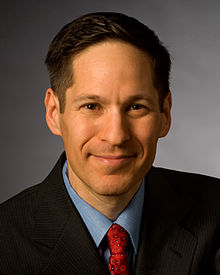Former CDC Director Arrested for Sexual Misconduct
/By Pat Anson, Editor
Dr. Thomas Frieden, the former director of the Centers for Disease Control of Prevention, has been arrested on sexual misconduct charges in New York City.
Frieden turned himself in to police in Brooklyn Friday morning after being charged with forcible touching, harassment and third degree sex abuse, all misdemeanors. The charges stem from a complaint filed in July by a 55-year old unnamed woman who alleges the 57-year old doctor grabbed her buttocks without permission in his apartment last October.
According to STAT, Frieden later apologized to the woman -- a longtime family friend -- and "tried to manipulate her into staying silent by citing his position and potential to save lives around the world."
Fried was arraigned Friday afternoon and released without bail, after a judge ordered him not to contact his accuser and to surrender his passport. He's due back in court October 11.
Frieden did not enter a plea. A spokesperson released a statement saying the incident "does not reflect Dr. Frieden’s public or private behavior or his values over a lifetime of service to improve health around the world.”
Frieden led the CDC from 2009 to 2017 and championed the agency’s controversial opioid prescribing guideline -- calling it an "excellent starting point" to prevent opioid abuse.
Although voluntary and only intended for primary care physicians, the guideline has been widely adopted by insurers, states and healthcare providers – resulting in many chronic pain patients losing access to opioid medication.
“This crisis was caused, in large part, by decades of prescribing too many opioids for too many conditions where they provide minimal benefit," Frieden wrote in a commentary published by Fox News. “There are safer drugs and treatment approaches that can control pain as well or better than opioids for the vast majority of patients."
DR. THOMAS FRIEDEN
Frieden currently heads Resolve to Save Lives, a program of Vital Strategies, a non-profit health organization that is trying to improve public health worldwide.
Vital Strategies released a statement saying Frieden informed the organization in April about the misconduct allegation. His accuser does not work for Vital Strategies, but the organization hired an investigator to interview employees about Frieden. No inappropriate workplace behavior or harassment was found, according to Vital Strategies CEO Jose Castro.
“I have known and worked closely with Dr. Frieden for nearly 30 years and have seen first-hand that he has the highest ethical standards both personally and professionally. Vital Strategies greatly values the work Dr. Frieden does to advance public health and he has my full confidence,” said Castro.
Frieden has an extensive background in epidemiology and infectious diseases, and his tenure at the CDC was marked by major efforts to combat the Ebola virus, fungal meningitis, influenza and the Zika virus.
Before his appointment as CDC director, Frieden was New York City’s health commissioner, where he led efforts to ban public smoking and remove unhealthy trans fats from restaurants. Frieden is married and has two children.








